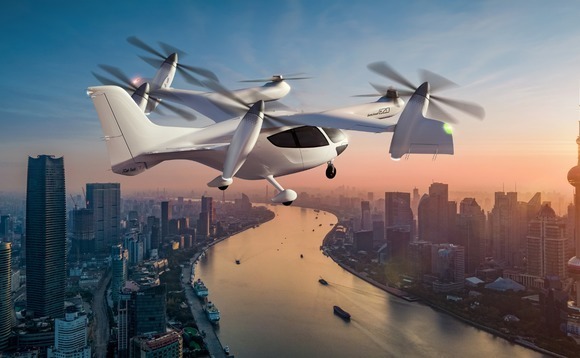
Deal focus: Taking electrification to China's skies

TCab Tech has won USD 15m in funding to bankroll its electric-powered alternative to helicopters. The path to market might be relatively short, but the wait for revenue will be longer
For many PE players, electric vehicles (EV) have been the biggest investment opportunity of the past decade in China. From independent EV manufacturers Nio, Xpeng, and Li Auto to battery giant CATL to the assortment of sensor specialists, chip makers, and autonomous driving start-ups that fill out the value chain, there have been plenty of home runs via the public and private markets.
The industry is now well-established with new energy vehicle sales reaching 6.88m units in 2022, up 93% year-on-year. The overall car market grew 2.1% to 26.86m units. So what else can be electrified and mainstreamed in the mobility space? Some investors are betting on aircraft.
They include Grand Flight, an industrial investment fund supported by financial leasing platform Far East Horizon, which recently led a USD 15m pre-Series A for TCab Tech, a Shanghai-based start-up focused on electric vertical take-off and landing (eVTOL) solutions. Kunlun Capital and Korea-based KIP Capital also came in as new investors, while the likes of BlueRun Ventures and Decent Capital re-upped.
EVTOLs are often compared to electrified helicopters. Unlike helicopters, eVTOLs cannot hover over an accident site, but they can fulfil most other functions. They are a much cheaper and safer option for tourists wanting to sight-see from the skies, according to Yon Wui Ng, TCab's founder and CEO.
The company was founded in 2021 by a group of engineers who previously worked at Terrafugia, a flying car start-up launched in the US that was acquired by Chinese automaker Geely in 2017. The new funding will go towards the development and test flights of the prototype E20 aircraft and its ultimate commercialisation under a planned transport-as-a-service model.
TCab is not an isolated example. Several Chinese eVTOL start-ups have quietly been raising early-stage capital. Zero Gravity secured angel funding from BlueRun in 2022 while Volant closed a pre-Series A of around CNY 100m (USD 15m) the same year. They are following in the footsteps of AutoFlight, which was founded in 2017 and received a Series A of USD 100m in 2021.
TCab's target market is urban air mobility (UAM), which involves the use of small aircraft to carry passengers or cargo at lower altitudes in urban areas, often as a response to traffic congestion.
Xpeng affiliate HT Aero, also known as Xpeng Huitian, is perhaps the most famous example. The start-up, which closed a Series A of more than USD 500m in 2021, has completed 15,000 safe manned flights in its flying car. Last October, it debuted the Xpeng X2, a two-seater aircraft.
While there are multiple ways to make UAM a reality, Ng regards eVTOL as the most direct path. "EVTOL is just a change brought about by electrification; it does not extend the innovation by combining cars and planes. The technology bar for flying cars is much higher than for eVTOL, so the R&D cycle is longer," he said.
In addition to technical challenges, there are obstacles on the application side. Regulations exist for the use of roads and the sky, but not both with a single mode of transportation. Commercialisation in this context could be tricky.
For eVTOL, the most obvious direct use case is replacing helicopters. Going electric means a simpler design – hence the improved safety level because there is less scope for malfunction – and a much lower cost. Space is another advantage. Conventional small aircraft tend to be single-engine or twin-engine; eVTOLs allow for multiple choices.
Ng believes that TCab can match the quality and safety standards of a five-seat, twin-engine helicopter, but at half the CNY 20m cost. Once scale is achieved, the price differential could fall to one quarter.
Tcab has now raised approximately USD 25m across three rounds. The company requires at least USD 100m for its eVTOL project – a sum that only covers R&D investment, not the construction of manufacturing plants or operation and marketing costs. "It would also take several years before we see any revenue," Ng added. "Patient money is needed."
Latest News
Asian GPs slow implementation of ESG policies - survey
Asia-based private equity firms are assigning more dedicated resources to environment, social, and governance (ESG) programmes, but policy changes have slowed in the past 12 months, in part due to concerns raised internally and by LPs, according to a...
Singapore fintech start-up LXA gets $10m seed round
New Enterprise Associates (NEA) has led a USD 10m seed round for Singapore’s LXA, a financial technology start-up launched by a former Asia senior executive at The Blackstone Group.
India's InCred announces $60m round, claims unicorn status
Indian non-bank lender InCred Financial Services said it has received INR 5bn (USD 60m) at a valuation of at least USD 1bn from unnamed investors including “a global private equity fund.”
Insight leads $50m round for Australia's Roller
Insight Partners has led a USD 50m round for Australia’s Roller, a venue management software provider specializing in family fun parks.








